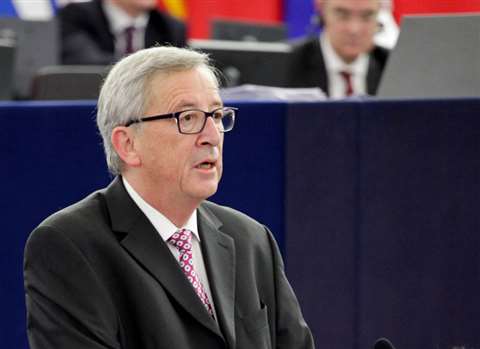Juncker addresses FIEC Congress
08 June 2015

A small amount of growth in the overall EU construction industry has been reported by FIEC (the European Construction Industry Federation) for 2014, with the trend forecast to continue this year.
FIEC vice president Jean-Louis Marchand, who is responsible for economic issues, said, “It looks like the construction industry hit rock bottom in 2013.
“Finally, 2014 was a turning point, but the return to growth remains very fragile and it started from a very low level.”
Marchand was presenting FIEC’s annual statistics to the FIEC Congress 2015 in Brussels, Belgium, where representatives of the EU construction industry put their demands for stronger competitiveness to European Commission President Jean-Claude Juncker, who told them that the plan which bears his name “must be a success”.
Juncker added, however, that an investment plan itself was not sufficient, and that it was essential that a global background allowed companies to operate in a peaceful setting.
He also said that without simplified, smarter legislation, the plan would not succeed.
“No growth is possible if we fail to pay attention to our industries in Europe,” said Juncker.
FIEC president Johan Willemen said, “If we want to set the basis for long-term sustainable growth of the economy and of employment in the EU, then it is time to move from ‘blind’ to ‘smart’ austerity.
“What everybody needs, is ‘enough and now’ and not ‘too little, too late’.”
The annual congress, with contractors from all over the EU, focused on the main drivers for stronger competitiveness of the construction industry – which, in 2014 represented almost 9% of the EU28 GDP – in the light of the Juncker Plan for investment, growth and jobs.
Willemen said, “The construction industry welcomes the Juncker Plan and we intend to play our role in the development of ‘good’ projects. But in order to be successful, we also need a new mindset for a real collaborative approach between our companies and the public sector, at all levels, as well as with the financial sector.”
He said, “It must also be ensured that SMEs (small and medium-sized enterprises), which constitute the largest share of our companies, can also fully benefit from the plan.”
Maintenance
During the discussions, it was suggested that the Juncker Plan should not be all about building new infrastructure, but also about the maintenance and upgrading of existing infrastructure. FIEC said that the cost of investment would not be lower if necessary renovation or rebuilding work were to be postponed.
It said that a balance between resource efficiency and the competitiveness of the construction industry must be found. It added that measures that were too ambitious and maybe even unnecessary would prove to be counterproductive and would damage competitiveness in the long term.
FIEC called for a level playing field to allow genuine competition between contractors, rather than “between social security and taxation systems”. It said there was therefore a need for strengthening the fight against all forms of fraud and, in particular, social fraud and undeclared work.
The European construction industry, it said, stood ready to accept these challenges and to take an active role in the implementation of the Juncker Plan, based on the know-how and experience of all its stakeholders.
Juncker told the congress, “Let’s remain humble, but also ambitious.”
Investment
Presenting the FIEC statistics, Marchand said, “More than ever, FIEC calls on European and national decision makers to replace blind austerity with smart austerity. This is what FIEC has kept asking for over the past few years – there can be no growth without investment, and the Juncker Investment Plan confirms that.”
He said EU total construction output amounted to €1.21 trillion in 2014, which represented a small increase of 0.7% over 2013.
“We will need time to catch up with the pre-crisis levels, but at least this positive trend seems to be continuing in 2015 as well.”
He forecast a rise of 0.8% for this year.
FIEC’s statistics showed that behind the small growth for the EU as a whole, huge disparities remained between north-western countries and south-eastern countries.
It said that in particular, the housebuilding segment regained significant momentum in 2014, up 2.3%, and was now leading the recovery. This trend was expected to continue at a similar pace in 2015 with a rise of 1.6%.
The non-residential segment was said to have stabilised finally, with a fall of 0.1% in 2014 and stable in 2015.
FIEC said that against this backdrop, the civil engineering segment was still struggling to recover (-2.1%), and that most Member States were not investing in public infrastructure, despite an increasing need.
In spite of the troubled period, the construction industry remains one of the major engines of Europe’s growth, said FIEC, adding that construction represented 8.8% of the European Union’s GDP and 3 million enterprises – the vast majority of which were SMEs.






